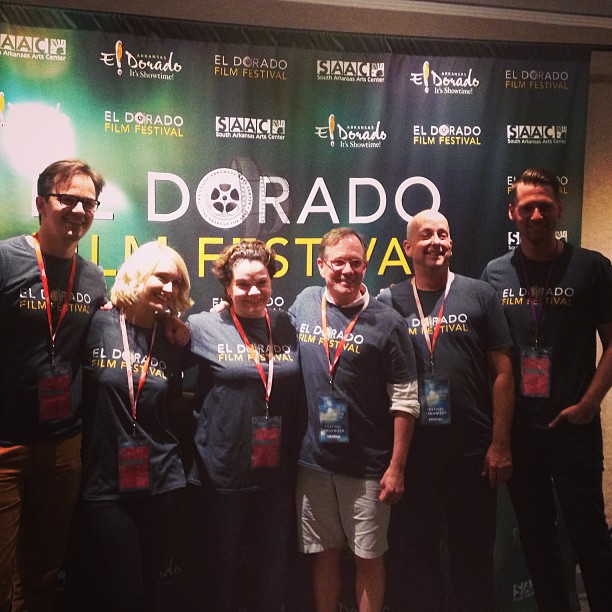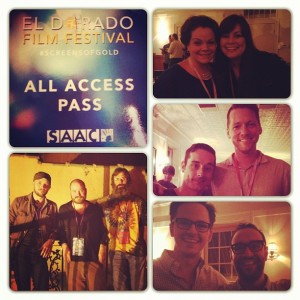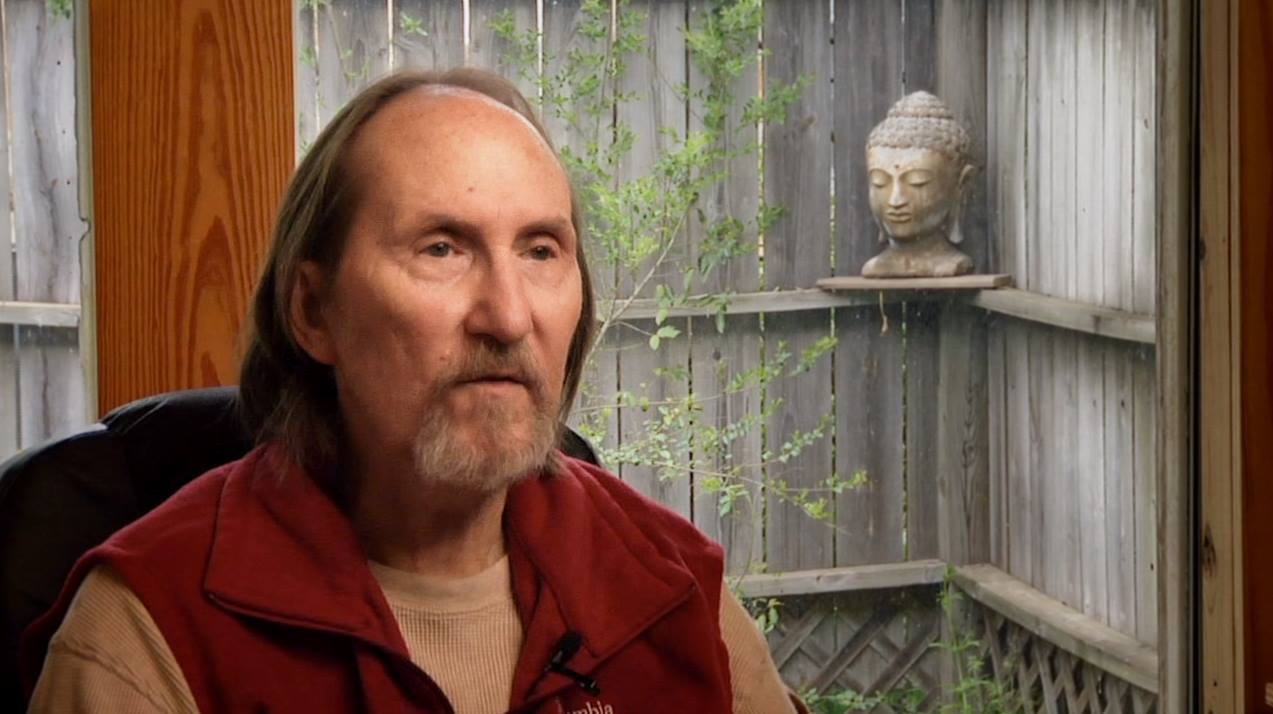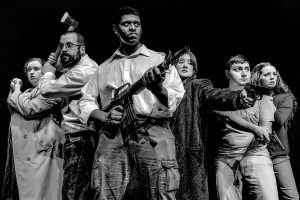El Dorado Film Festival kicks off with a strong first year

WORDS & PHOTOS / KODY FORD
Creating lasting change in an area takes time and effort. For El Dorado, a town who’s beginnings were shaped by wildcatters in the oil fields, the shift from being the industrial hub of southern Arkansas to being a cultural destination is an ongoing process, one that the community has embraced over the last few years, after building a conference center and launching an effort to create more events and festivals. Now the city of black gold is looking to become the city with screens of gold as it kicked off its inaugural film festival.
The El Dorado Film Festival took place at the South Arkansas Arts Center (SAAC) on September 18-20 in conjunction with SAAC’s 50th anniversary. The idea of a small southern town launching a festival to showcase films from around the world might conjure up images of the movie “Waiting for Guffman,” but this event brushed aside the stereotypes of “yokels gettin’ arsty” and delivered a well-organized and entertaining weekend that impressed filmmakers and audience members alike.
Laura Barrow, an El Dorado business owner and former actress, took the reigns. While Laura has produced and acted in films, she had never organized a film festival before and the learning curve was steep. However, with the committee’s help and advice from members of the Arkansas film community such as Christopher Crane, Courtney Pledger and Levi Agee along with director Gerry Bruno and Louisiana International Film Festival Organizer Jency Griffin Hogan, they were able to put together the festival in time. Committee member Alexander Jeffery brought his experience as a filmmaker and festival goer to help broaden the idea from a “small, quaint film festival,” as Laura put it, into something much more ambitious. They sought a happy medium that was classy yet accessible for the region, something that harkened back to the glory days of the Rialto Theatre in downtown.
“We wanted to make it feel like El Dorado, that was the only personal touch,” Laura said. “We did not want to reinvent the wheel. We wanted to make it like other successful festivals.”
 Southern hospitality was very important to the organizers so they assigned each filmmaker a personal liaison that would oversee film schedules, flight itineraries and lodging for the individual.
Southern hospitality was very important to the organizers so they assigned each filmmaker a personal liaison that would oversee film schedules, flight itineraries and lodging for the individual.
Joel Froome, a New York-based cinematographer, had two films shown in the festival—“The Grand Design” and “My Mother, Her Daughter,” the latter of which he won for Best Cinematography. Having traveled to festivals around the world, Froome said he was truly impressed by what he saw during his time in El Dorado.
“I’ve been lucky enough to have films screened around the world,” he said. “This is one of the highest quality ones and the people here were great. As a cinematographer, you never have control over how it’s projected, but the facilities were state of the art. It’s everything you want.”
The festival offered a diverse selection of genres and nationalities with some features and shorts coming from the United Kingdom, Australia and Scandinavia. When reviewing entries, Jeffery said that content and genre were not the main considerations. “We wanted [each film] to be a well-made piece of work with a lot of passion and drive going into it,” he said.
While the films came from around the world, many had Arkansas connections. “The Emergency Room” and “Losing Gracie” were directed by University of Arkansas alumn Daniel Hanna. “How to Make It to the Promised Land” featured actress Marlane Barnes, originally of Fort Smith and recently scene in “Twilight: Breaking Dawn, Part 2”; “Mad Men” and “Sons of Anarchy”. Little Rock director Daniel Campbell’s short “The Discontentment of Ed Telfair” won for Best Original Music.
Along with films, speakers such as Howard Klausner, screenwriter of the Clint Eastwood film “Space Cowboys” and Chuck Mere’, of “Zombie Go Boom,” spoke and gave workshops. Mere’ is a Fayetteville resident and YouTube superstar who’s show gives viewers the lowdown on how to survive the zombie apocalypse. On Saturday, he taught a workshop called “Blood and Guts” that delivered on its gory promise.
“People loved our workshop,” he said. “We knew we’d be doing something different for people here. We taught them how to make fake blood, squibs [exploding blood from gunshots], zombie head analogues and fake guts. We splattered a bunch of fake blood and fruit on the audience. They really enjoyed themselves.”
Audience members were given a special sneak peek at a locally produced film “Contact,” which was directed by Jeffery and co-written by him and Austin Barrow. Laura helped produce it. Jeffery is putting the finishing touches on it and plans to submit to film festivals next year. The film’s focus on perception keeps the audience on its toes, with enough turns to seem like Stephen King has taken up comedy. It should do well in the festival circuit next year.
It was filmed in El Dorado and features an almost exclusively local cast. Jeffery was pleased with the audience reception for the film and is looking forward to premiering the completed film at a festival soon.
“We were very happy with everyone’s reactions,” he said. “When we were making it we wondered if people would find humor in it, but they laughed at the right times and went along for the ride. We still have some work to do on the film, but it felt very successful.”
Director Jonnie Stapleton and actor/writer Paul Petersen won audience choice award Best of the Fest for “The Beacon,” a touching short film about a husband who loses his wife and daughter. They had been working on the film since 2011 after Petersen joined Stapleton in L.A. after having struck a friendship at the University of South Dakota. It was originally conceived as a story about getting over a failed relationship but soon evolved to focus on more serious loss. During post-production, they found out that Petersen’s mother had terminal cancer and rushed to get a cut for her to see before she passed. The film is dedicated to her memory.
Stapleton said the best way to sum up his thoughts on winning the top prize along with $1,000 was “speechless.”
“Paul and I were very shocked because we did not anticipate this,” he said. “There were so many great films here that touched me. I know that’s always what’s said but it made it so hard to believe. We were very thrilled that people took away from the film what we hoped they would. It’s about overcoming difficulty in your life.”
Petersen added, “This was such a collaborative effort for the people doing it because they loved it and we all believed in the project.”
Petersen, who originally moved to L.A. to become a writer, won for Best Actor. He said he might shift his focus more to acting in the future. The money will go to paying back what they have spent on production and to enter more festivals.
After the awards were given out, Laura and her committee members seemed pleased with the event. Next year, she hopes that they can bring in more films and expand the festival to the soon-to-be-renovated Rialto Theatre.
Jack Wilson, executive director of SAAC, was happy as well.
“I’m extremely proud that we were able to introduce another new arts genre and the response we received from the public and the filmmakers gave it real legitimacy,” said Wilson. “To have big names like Howard Klausner and Chuck Mere’ made it even better.”
Big things have small beginnings and it seems like El Dorado is on the right path. The city of gold may be on its way to an ongoing relationship with the silver screen.
LIKE THE FESTIVAL ON FACEBOOK.
Festival Award Winners:
Cinematography: Joel Froome, My Mother Her Daughter
Editing: Anil Griffin, The Grand Design
Actor: Paul Petersen, The Beacon
Actress: Cheree Cassidy, A Man on the Edge
Road to El Dorado International Film Award: Marie, United Kingdom
Makeup: Chuck Mere, Love Struck Dead
Sound design: Johan Windh, Glimma
Best original music: Amos Cochran, The Discontentment of Ed Telfair
Adapted screenplay: Horton Foote, One Armed Man
Original screenplay: Craig Elrod, Molly
Best director: Nathan Hansen, Applesauce
Color grading: Matthew Pickett, Restitution
Best Narrative Short: B-Flat, India/Brazil
Best Documentary Short: Room 19, Kimberley Browning
Best Narrative Feature: Life Inside Out, Tessa Bell
Best Documentary Feature: Something You Can Call Home, Rebecca Kenyon
Best Southern Made: One Armed Man, Tim Guinee
Best of Fest: The Beacon, Paul Petersen and Jonnie Stapleton




1 comment
Great write up, thank you Kody!